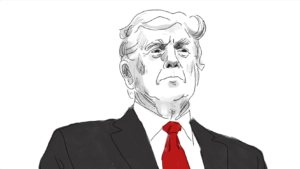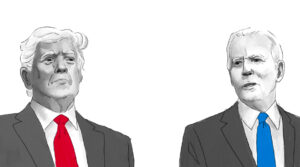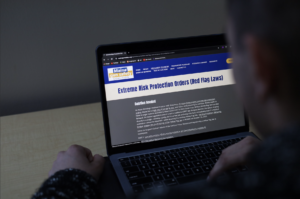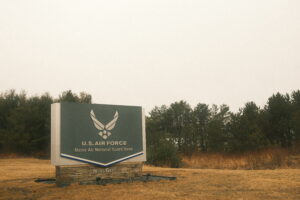Hundreds of students on Monday, Sept. 26 packed the North Pod of the Memorial Union at the University of Maine campus in Orono to watch the two major party political candidates Donald Trump and Hillary Clinton square off in the first presidential debate.
The North Pod, normally seated with tables and chairs distributed proportionally throughout the room, was packed wall-to-wall with seating for students who sat and listened intently for the entirety of the debate, which started at 9 p.m. Many students watched from the back of the room, standing for the entirety of the 90-minute debate.
The event, sponsored by the University of Maine Political Science Department and the Honors College, focused on enhancing civic engagement in the community and stressed the importance of voter registration. A table aligned perpendicular to the entrance of the North Pod was set up for students to register to vote and was made available throughout the duration of the event. Faculty at the event expressed that the millennial voting bloc is crucial to the upcoming election, therefore students must both register to vote and make their way to the polls in November.
While the event was the first of its nature at the Orono campus since 2008, none of its organizers anticipated the attention the event received. Robert Glover, a faculty member of the Political Science Department and event organizer, was impressed with the level of intrigue the event drew across campus and the number of students and faculty members who showed up to watch and participate in the discussion.
“I definitely think there has been a lot of interest leading up to this, like in the primaries and leading up to this debate. I think it only takes a couple of motivated individuals to put something like this together,” Glover said.
“I also think part of [the interest in the event] is the candidates, part of it is that it’s unprecedented to have two candidates that are so thoroughly disliked across so many different demographics. And, a lot of people want to see what Trump in a one-on-one debate looks like.”
UMaine College Republicans and College Democrats both tabled at the event and helped inform students of their party’s platforms and ideologies before and after the event, handing out pamphlets, stickers and other political gear to prospective millennial voters.
Abby Bennett, Chairman of the Maine Federation of College Republicans and a member of the Civic Engagement Committee at UMaine, discussed the communal benefits of hosting political events on campus and the importance of having student political organizations present in the debate.
“We came together to organize this event and I think it’s great that both the UMaine Dems and College Republicans can table so people know who we are and know about the issues and talk to us about why we believe what we believe,” Bennett said.
Trump, the international business mogul and Clinton, the former secretary of state, gave students and faculty plenty to discuss in their campaigns leading up to debate night. Many students and faculty members wondered what persona Trump would take on for the first debate and if he could keep his message centered and clear throughout the night. Others speculated that he would remain his fiery self, engaging in discourse with the one-liners and off the cuff comments we’ve grown used to seeing from him throughout primary season.
“I know Trump has said that he’s not preparing in the conventional ways that folks prepare for debates. I suspect that Clinton is, but in a two person debate, one person is always gonna be responding to the other side and so if Trump comes in as the conventional Trump that he’s been, she’s gonna have to respond to that and it’s gonna look a little different than past debates,” Glover said.
Bennett vocalized her concerns with Clinton’s rehearsed rhetoric, an aspect of politics that has driven so many to Trump’s unconventional campaign.
“I think Hillary is gonna be very predictable, as she always is,” Bennett said.
While this was only the first debate this election cycle, these adversarial events have the potential to make or break a candidacy based on individual performance. Though it seems substantive policy responses would earn you the most points among undecided voters, often times it is the “sound bites” we hear on the news that have the most resounding affect.
“I like to think that the policy side of things are more important,” UMaine College Democrats President Brody Haverly-Johndro said. “I know that Donald Trump is very popular and very well known for sound bites, that’s part of the rise of his candidacy. But I hope [the debate] is really focused more on policy and I know Secretary Clinton has put forth numerous plans for every issue and is really detailed in her policy and she’s known for that.”
The debate covered a wide array of topics, from the economy and jobs to the birther movement and growing national security threat of ISIS. Trump dug in on Clinton for her lengthy career in politics and her email scandal that warranted an FBI investigation. Clinton shot back at Trump for his vulgar comments towards women and for stiffing contractors and other low-level workers on payment throughout his business career.
Most scientific polling released after the debate, especially polls conducted on undecided voters, showed Clinton winning handily, but many unscientific polls conducted online immediately after the debate showed Trump as the winner by wide margins. Most national pundits agreed Clinton had the better overall performance.
After the debate concluded, students got the chance to speak to the group about the candidates’ statements during the debate, as well as their policy positions and individual performance . The discourse grew heavy, as some students shared their controversial opinions about the presidential race and broader concerns about our collective political future.
Altogether, the event enabled students to get involved in the political process and learn new information about the policy challenges we face as a nation.
“I think [the event] benefits everyone really. I think it benefits student because they get to hear more than one side of the issues and it benefits faculty to get students more involved on and off campus,” Haverly-Johndro said.












